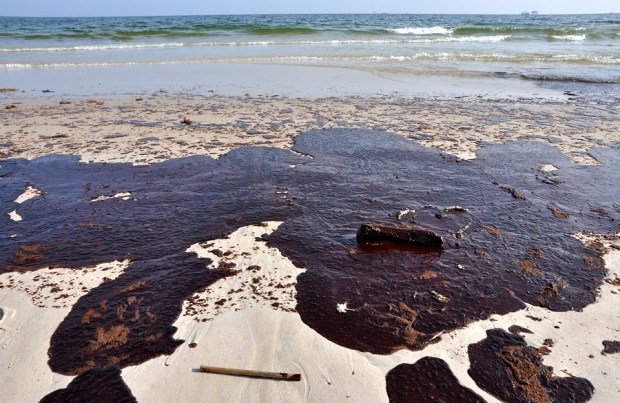Halliburton Co is in “advanced” talks to settle private claims against it in a trial to
determine blame for the 2010 Gulf of Mexico spill, the oilfield services company said on Monday, as it booked a $1 billion pretax charge for a possible deal.
Disclosure of the “court-facilitated” talks in the last month, which some legal experts tracking the BP trial linked to a series of missteps with evidence presented by Halliburton lawyers in the courtroom, helped push its shares up nearly 6 percent.
The news came only days after the end of court proceedings for the first phase of the trial over claims brought by the U.S. government, Gulf Coast states, and private parties affected by the worst U.S. offshore oil spill.
The second phase, due to start in September, will address exactly how much oil spilled.
While Halliburton is not the subject of direct federal government actions, BP Plc has tried to hold Halliburton and rig owner Transocean Ltd partly responsible for damages in the case.
Even with a private claims settlement, the exact scope of Halliburton’s liability will be unclear until the conclusion of the multi-district litigation consolidated under Judge Carl Barbier in New Orleans.
Halliburton carried out the cement work on the Macondo well, which spilled more than 4 million barrels of oil after the blowout which destroyed the Deepwater Horizon rig and killed 11 workers.
“Over the past month or so, we have participated in court facilitated settlement discussions with some of the parties included in the multi-district litigation, with a goal of resolving a substantial portion of the private claims against us in this matter,” Chief Financial Officer Mark McCollum told analysts on a conference call.
The company was not immediately available to comment further.
Halliburton had a rough time at the trial over the past month. First, it belatedly introduced cement samples into evidence. Then the company’s lawyers produced documents late and prompted Judge Barbier to say he found their handling of the matter “troubling,” with a threat of sanctions.
Legal experts following the case, speaking privately, said the developments only added to the urgency of a settlement deal.
Halliburton believed an “early and reasonably valued” resolution was in the best interests of shareholders, and its most recent offer included cash components payable over time as well as stock, Chief Executive David Lesar said.
“Discussions are at an advanced stage but have not yet resulted in a settlement,” Lesar said, explaining what amounts to an after-tax charge of $637 million, which pushed the company to a loss for the first quarter.
The charge is based on where Halliburton is in the negotiations, Lesar said. It is on top of a first-quarter 2012 charge of $191 million after taxes, or $300 million before taxes.
The $1.3 billion reserve does not include any potential insurance recovery. McCollum told the analysts the reserve may be revised up or down, but executives declined to take further questions about the possible settlement or trial on the call.





















 Premium Slowdown, Inflation Factors to Lead to Higher P/C Combined Ratio: AM Best
Premium Slowdown, Inflation Factors to Lead to Higher P/C Combined Ratio: AM Best  Reinsurance Program Could Wipe Out Need for Calif. FAIR Plan: Legal Exec
Reinsurance Program Could Wipe Out Need for Calif. FAIR Plan: Legal Exec  Beyond Automation: The Emerging Role for Contextual AI in Insurance
Beyond Automation: The Emerging Role for Contextual AI in Insurance  Is Risk the Main Ingredient in Ultra-Processed Food?
Is Risk the Main Ingredient in Ultra-Processed Food? 





